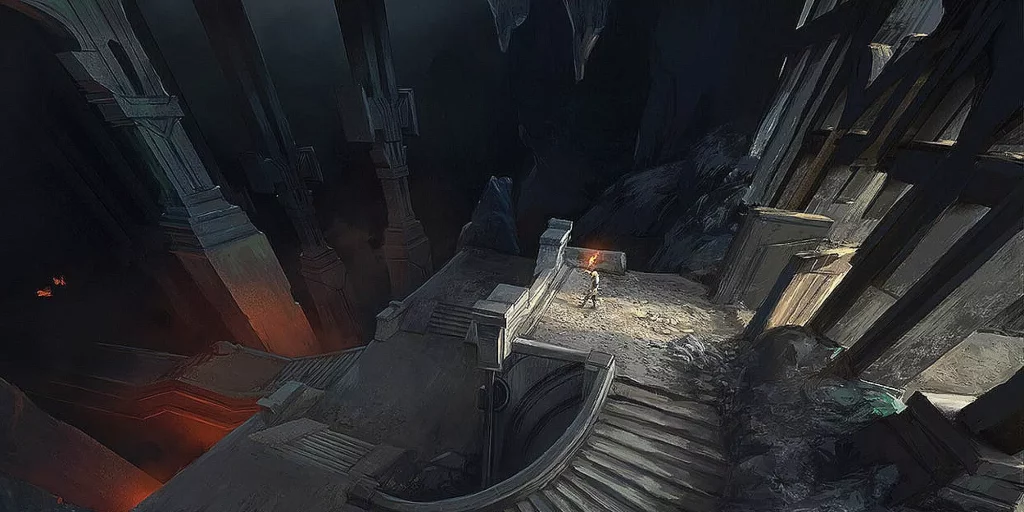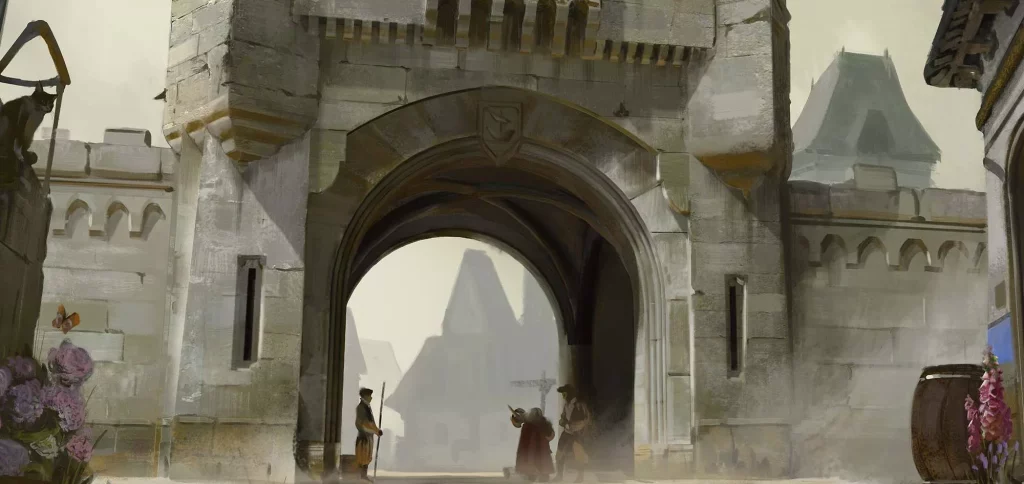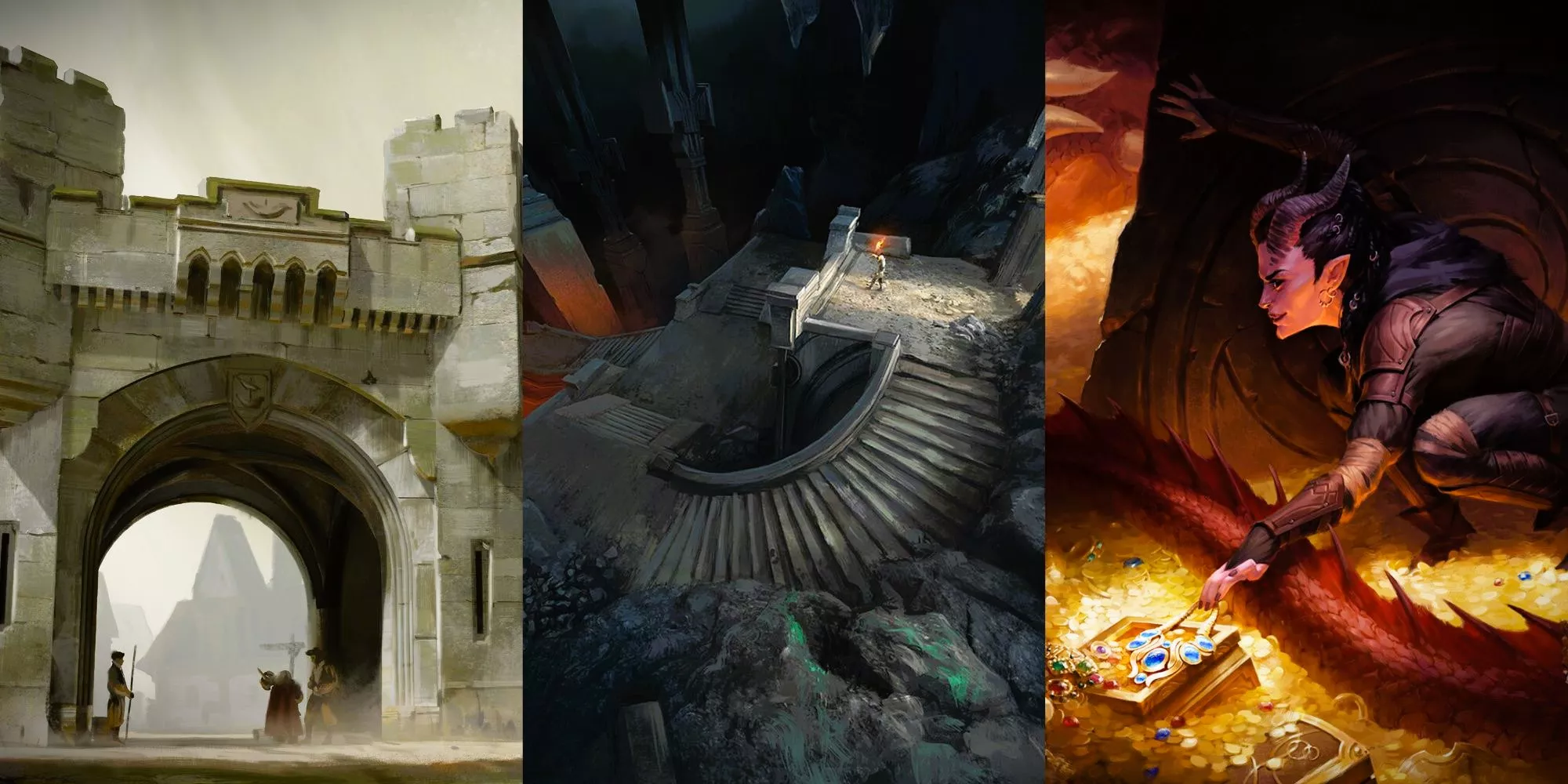For an optimal location to incorporate a mimic within your Dungeons & Dragons adventure, consider these recommended settings. Mimics are adored creatures within the realm of Dungeons & Dragons, yet their presence can become glaringly conspicuous if positioned unwisely throughout your campaign. On occasion, it can prove amusing to include a clumsily camouflaged mimic, serving as a way to acquaint your players with the forthcoming mimic encounters. Nevertheless, for the majority of instances, the preference lies in adeptly concealed mimics, necessitating their placement in contexts that are rational. Mimics lack a native habitat in which they thrive and rampage freely; nonetheless, there certainly exist environments where their integration seamlessly melds.
Treasure Troves

Mimics commonly manifest in the guise of treasure chests, a portrayal grounded in logic. Frequently, these creatures are concealed within a cache of riches, luring in unassuming adventurers who gather their newfound loot. It’s conceivable that your group could even acquire an inadvertent mimic companion, animated by their shared enthusiasm for treasure, a scenario that might initially appear endearing but eventually take a poignant turn.
Consider that what transpired prior to encountering the mimic might not have been the pivotal confrontation; instead, the mimic itself becomes the veritable hoard, prepared to satiate its appetite with covetous explorers.
Wizard Towers

During the initial era of Dungeons & Dragons, mimics were commonly thought to be constructs crafted by wizards, intended to safeguard their towers and the valuable contents therein from both adventurers and thieves. Considering the mimic’s adeptness at seamlessly assimilating into its environment, there’s an opportunity to introduce intrigue by having seemingly magical items transform into mimics only upon attunement by your players.
Confronting a mimic amidst the exploration of a wizard’s tower might prove enjoyable in a solitary campaign scenario, especially due to the confined spaces typical of such environments, which deviate from the standard party dynamic.
Dungeons

Mimics find a timeless abode within dungeons, particularly in the depths where more avaricious explorers seek valuable riches while aiming for a swift exit. These creatures aptly entice such adventurers, a strategy that proves even more effective if your group embodies this very approach.
Vigilance remains paramount within dungeons, as a mere lapse in awareness can lead to stumbling upon overt pitfalls, such as a mimic masquerading as a treasure chest.
Dark Caves

Placing your mimics in more distant locations, where visibility is limited, significantly amplifies the likelihood of them being misconstrued as authentic elements. The farther you can position the mimic – or even an assemblage of them – within the cavern, the more advantageous the outcome.
This approach will heighten the challenge for your players to extricate themselves from the combat zone, while simultaneously facilitating the potential for a swarm of mimics to corral them towards the rear recesses of the cave. There’s no necessity for a specific narrative rationale regarding the presence of a mimic hoard in a cave; it could merely be their preferred hunting strategy.
Abandoned Homes

Determining whether the mimic played a role in the abandonment of the dwelling or opportunistically settled in after its previous occupants departed lies within your purview as the Dungeon Master. Nonetheless, if your players embark on the venture with the expectation of discovering valuable spoils, they will encounter an unexpected twist when confronted by an abrupt mimic assault.
The mimic’s guise could span from that of a door or a painting to even an amulet of sorts. With a dash of luck, your players might not even discern the mimic’s true nature until they’ve inadvertently fallen into its trap.
Taverns

Venturing into a Tavern Cellar remains an activity limited to inebriated patrons, rogues, and tavern staff. Should the tavern employees be privy to the mimic’s presence in the cellar, it’s plausible that the mimic serves as a form of security, thwarting any attempts to procure more alcohol than what’s been paid for.
In a different scenario, the mimic might not inhabit the cellar but instead assume the guise of a musical instrument left behind, presumed to be an artifact of some bard. If your bard takes a liking to this apparent instrument, particularly if it ranks among the finest in the realm of Dungeons & Dragons, it could potentially lead to a captivating encounter, either immediately or in the future.
Shady Back Markets

In the event that your players find themselves embroiled in a dubious black-market transaction, circumstances might unfold where attempting to vend a mimic becomes conceivable. Alternatively, the mimic could ingeniously infiltrate the inventory of an indifferent merchant, someone primarily concerned with monetary gain rather than the nature of their goods. After all, a policy of no returns, no grievances, and no issues seems alluring. A seemingly impeccable deal could swiftly devolve, as the purchased item promptly transmutes into its mimic manifestation, revealing the truth behind its alluring façade.
Warehouses

What more opportune location to infiltrate than an establishment perpetually bustling with merchandise being transported in and out around the clock? Within a warehouse, a mimic could go undetected for an extended duration, relishing abundant sustenance and contentment, until a conspicuous number of laborers begin to vanish.
Diverging from their wilderness-dwelling counterparts, this mimic can seamlessly blend into urban and densely populated regions as long as it confines itself to the confines of the warehouse. This could also serve as a splendid means to dabble in a contemporary backdrop, as warehouses stand as ubiquitous fixtures in the modern world.
Dark Forests

Concealed just beyond their visual range, shadowing among trees, and tailing your players, exist terrors that can merely fade against the backdrop of your players’ own imaginings. Within a Murky Woodland, an array of perils could lurk, among them the cherished mimics that might even appear less ominous compared to many entries in the Monster Manual.
Nevertheless, these creatures would find themselves quite at home in a Murky Woodland, blending seamlessly among the trees or masquerading as potential respites from the eerie ambiance, awaiting the arrival of your party.
Ghost Towns

An abandoned town presents a canvas for unfettered creativity when it comes to crafting mimic disguises. While the classic choices of a treasure chest or a door remain, the possibilities stretch much further. Why not fashion an entire structure into a mimic that has engulfed the entire town?
This context offers a chance to explore how an inconspicuous element within a town can precipitate its downfall before anyone grasps the unfolding calamity. To nudge your players toward engaging with this covert mimic, you could contemplate a scenario where the town isn’t fully deserted and decrepit just yet.
